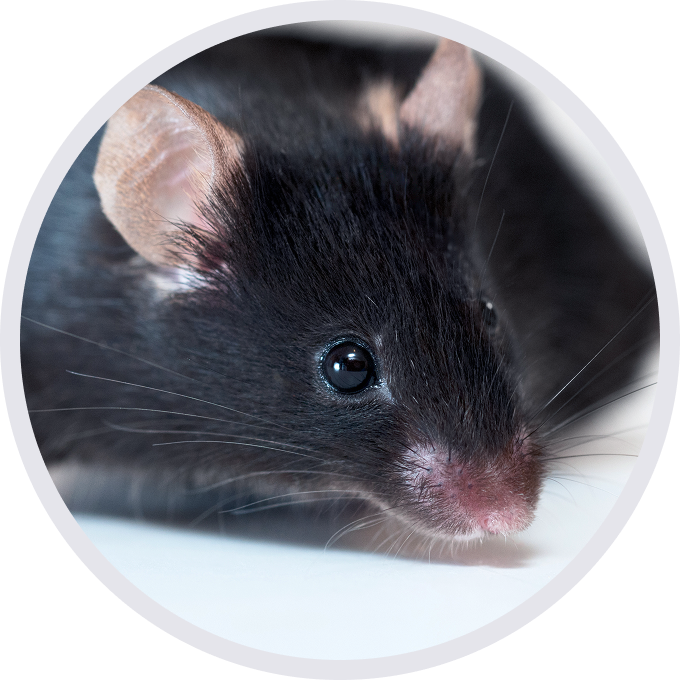
C57BL/6-Pdcd1tm1(PDCD1)BcgenCd274tm1(CD274)BcgenKlrd1tm1(KLRD1)BcgenKlrc1tm1(KLRC1)Bcgen/Bcgen • 111848

| Product name | B-hPD-1/hPD-L1/hCD94/hNKG2A mice |
|---|---|
| Catalog number | 111848 |
| Strain name | C57BL/6-Pdcd1tm1(PDCD1)BcgenCd274tm1(CD274)BcgenKlrd1tm1(KLRD1)BcgenKlrc1tm1(KLRC1)Bcgen/Bcgen |
| Strain background | C57BL/6 |
| NCBI gene ID | 5133,29126,3821,3824 (Human) |
| Aliases | PD1; PD-1; CD279; SLEB2; hPD-1; hPD-l; hSLE1; ADMIO4; AIMTBS; B7-H; B7H1; PDL1; PD-L1; ADMIO5; hPD-L1; PDCD1L1; PDCD1LG1; NKG2; NKG2A; CD159A; CD94 |
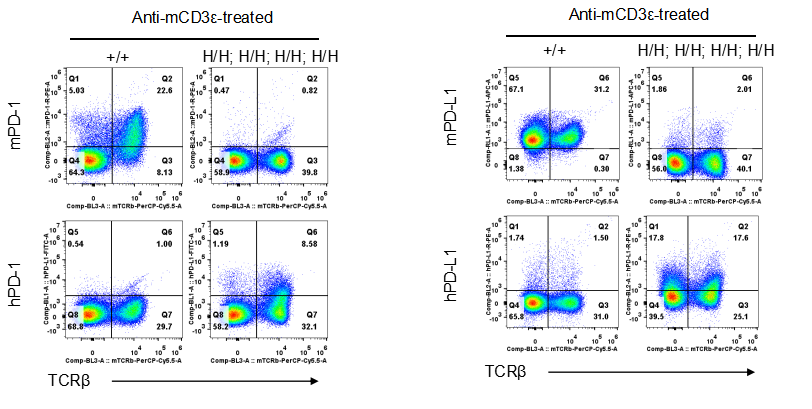
Strain specific PD1 and PD-L1 expression analysis in homozygous B-hPD-1/hPD-L1/hCD94/hNKG2A mice by flow cytometry. Splenocytes were collected from wild type mice(+/+) and homozygous B-hPD-1/hPD-L1/hCD94/hNKG2A mice (H/H; H/H; H/H; H/H) stimulated with anti-CD3ε in vivo , and analyzed by flow cytometry with species-specific anti-PD-1 and anti-PD-L1 antibodies. Mouse PD-1 and PD-L1 were exclusively detectable in wild type mice. Human PD-1 and PD-L1 were exclusively detectable in homozygous B-hPD-1/hPD-L1/hCD94/hNKG2A mice but not in wild type mice.
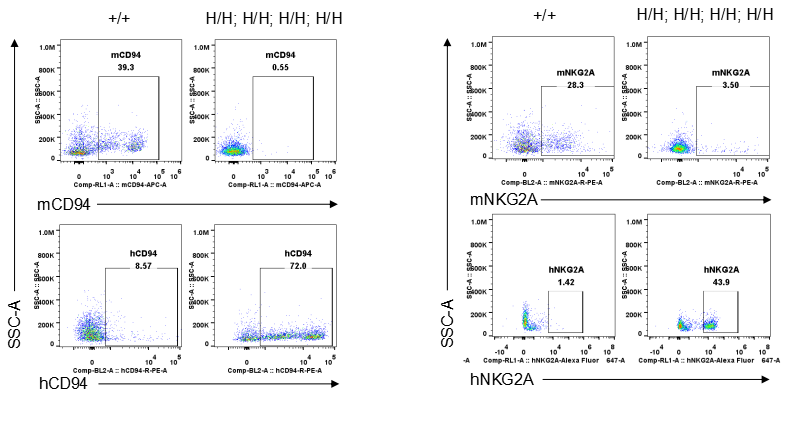
Strain specific CD94 and NKG2A expression analysis in homozygous B-hPD-1/hPD-L1/hCD94/hNKG2A mice by flow cytometry. Splenocytes were collected from wild type mice (+/+) and homozygous B-hPD-1/hPD-L1/hCD94/hNKG2A mice (H/H; H/H; H/H; H/H), and analyzed by flow cytometry with species-specific CD94 or NKG2A antibodies. Mouse CD94 and NKG2A were detectable in wild type mice. Human CD94 and NKG2A were exclusively detectable in homozygous B-hPD-1/hPD-L1/hCD94/hNKG2A mice but not wild type mice. (Monalizumab (in house) was used to detect the human NKG2A protein expression)
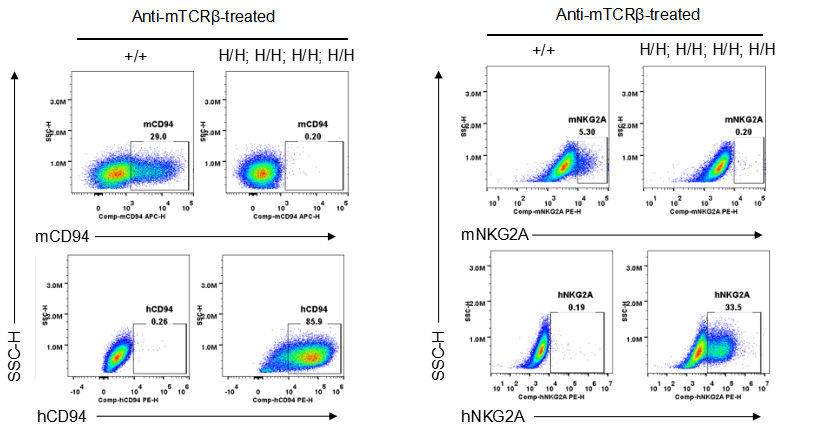
Strain specific CD94 and NKG2A expression analysis in homozygous B-hPD-1/hPD-L1/hCD94/hNKG2A mice by flow cytometry. Splenocytes were collected from wild type mice and homozygous B-hPD-1/hPD-L1/hCD94/hNKG2A mice (H/H; H/H; H/H; H/H), and analyzed by flow cytometry with species-specific CD94 or NKG2A antibodies. Spleen cells were stimulated for the 5 days coated with 5 μg/ml anti-TCRβ mAb before analysis. Mouse CD94 and NKG2A were detectable in wild type mice. Human CD94 and NKG2A were exclusively detectable in homozygous B-hPD-1/hPD-L1/hCD94/hNKG2A mice but not wild type mice. (Monalizumab (in house) was used to detect the human NKG2A expression)
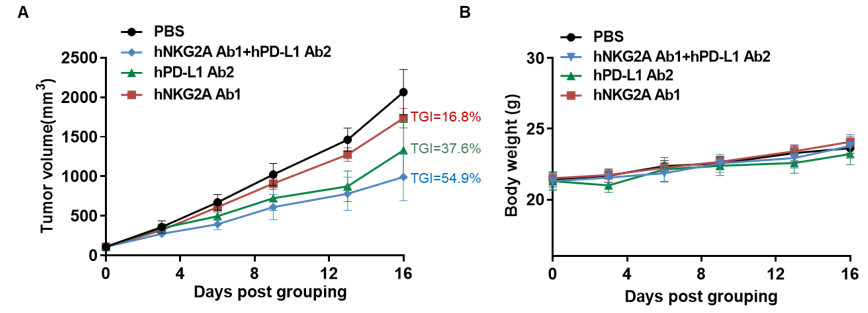
Antitumor activity of anti-human NKG2A antibodies and anti-human PD-L1 antibodies in B-hPD-1/hPDL1/hCD94/hNKG2A mice. (A) Anti-human NKG2A antibodies (in house) combined with anti-human PD-L1 antibodies (in house) inhibited B-hHLA-E plus/hPD-L1 MC38 tumor growth in B-hPD-1/hPDL1/hCD94/hNKG2A mice. Murine colon cancer B-hHLA-E plus/hPD-L1 MC38 cells were subcutaneously implanted into homozygous B-hPD-1/hPDL1/hCD94/hNKG2A (female, 7-8-week-old, n=6). Mice were grouped when tumor volume reached approximately 100 mm3, at which time they were treated with anti-hNKG2A Ab1 and anti-hPD-L1 Ab2. (B) Body weight changes during treatment. As shown in panel A, combination of hPD-L1 and hNKG2A antibodies were more efficacious in controlling tumor growth in B-hPD-1/hPDL1/hCD94/hNKG2A mice. B-hPD-1/hPDL1/hCD94/hNKG2A mice is a powerful preclinical model for in vivo evaluation of anti-human PD-L1 and NKG2A antibodies. Values are expressed as mean ± SEM.